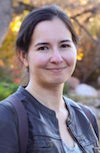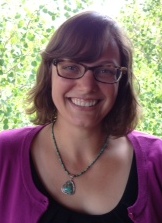ACM Bioinformatics, Computational Biology, and Health Informatics Conference (ACM BCB)
Boston, August 20th, 2017
A Half-day Student Mentoring Workshop
Invited Speakers

Christina Boucher
Assistant Professor |
Christina Boucher is an Assistant Professor at the University of Florida. Her main research interests are in genome assembly and antibiotic resistance. She has over 40 publications in bioinformatics. Her lab is funded by the USDA and NSF. She received her PhD in Computer Science at the University of Waterloo in Canada, and held a NSERC postdoctoral fellowship at the University of California at San Diego between 2011 and 2012. As a graduate student, she was a recipient of the NSERC doctoral award and a Google Anita Borg Memorial Scholarship. |

Lenore Cowen
Professor |
Lenore Cowen is a professor in the Department of Computer Science at Tufts University, with a courtesy appointment in the Department of Mathematics. After finishing her Ph.D. in mathematics at MIT in 1993, she was an NSF postdoctoral fellow and then joined the faculty of the Mathematical Sciences Department (now the Applied Mathematics and Statistics Department) at Johns Hopkins University. She joined Tufts in 2001. Her research interests span three areas: discrete mathematics, algorithms, and computational molecular biology. |

Noah Daniels
Assistant Professor |
Noah M. Daniels is an Assistant Professor of Computer Science at The University of Rhode Island. After several years in industry at a variety of data science-oriented startup companies, he completed his Ph.D in Computer Science at Tufts University under the supervision of Dr. Lenore Cowen, and then held a postdoctoral position at MIT under Dr. Bonnie Berger. Dr. Daniels is interested in computational biology and data science from an algorithmic perspective, particularly focusing on how the high-dimensional geometric structure of large data sets can lead to better algorithmic approaches. |

Bruna Jacobson
Research Assistant Professor |
Dr. Jacobson is a Research Assisant Professor in Computer Science at the University of New Mexico. She has a Ph.D. in theoretical and computational condensed matter physics from the University of Southern California in 2012. She has extensive experience with computational methods, such as kinetic Monte Carlo, Markov theory, simulated annealing, and Metropolis algorithms applied to problems in biophysics and condensed matter physics. Her current research interests are in computational biophysics, ranging from modeling molecular motors to protein aggregation, non-equilibrium stochastic processes, and phase transitions in soft condensed matter systems. |

Filip Jagodzinski
Assistant Professor |
Filip is an assistant professor of computer science at Western Washington University. He earned his B.S. degree from Columbia University in biomedical engineering in 1999, and his M.S in computer science from Villanova. After earning his bachelors, he worked as a laboratory technician in charge of the laser confocal microscope in the Tatton neurology lab in Mt Sinai Hospital in New York, where he helped with Parkinson's Disease and cell apoptosis research studies. After earning his masters, Filip was the lead software developer for 2 years at a startup outside of Philadelphia. In 2005 he began his PhD studies at the University of Massachusetts, Amherst, where he bridged his undergraduate biomedical experience with the computer science skills he acquired at Villanova. He teaches both undergraduate as well as graduate courses, and is active in a variety of outreach activities including teaching computer science to grandparent, grandchildren pairs during a week-long summer course at WWU. He supervises and works closely with approximately a dozen undergraduate and graduate students on a handful of computational biology projects, including mutation analysis and predictions, as well as computational genetics. In addition to developing algorithms and software, Filip and his students are keen at disseminating their research via web servers doling up data visualizations and graphical user interfaces to foster interaction with back-end software. |

Knut Reinert
Professor |
Knut Reinert holds the chair of the Algorithms in Bioinformatics group at the Institute of Bioinformatics at Freie Universität Berlin. In addition, he is a Max Planck fellow at the Max Planck Institute for Molecular Genetics. He and his team focus on the development of novel algorithms and data structures for practical problems arising in the analysis of biomedical mass data and the efficient implementation of the algorithms in software libraries like SeqAn or OpenMS. Previously, Knut did his Phd at the Max-Planck-Institute for Computer Science in the group of Kurt Mehlhorn. After receiving his PhD he joint Gene Myers in the Informatics Research team at Celera Genomics, where he worked on bioinformatics algorithms and software for genome assembly and mass spectrometry. In 2002 he became full professor at the Freie Universtät Berlin and since then graduated numerous PhD and MSc students and coauthored around 100 research papers. He served on numerous PC committees as committe member and (co)chair. |

Anna Ritz
Assistant Professor |
Anna Ritz is an Assistant Professor of Biology at Reed College in Portland, Oregon. Her current research develops network-based algorithms to identify signaling pathway dysregulation in diseases such as cancer. Before she arrived at Reed in 2015, she was a postdoctoral researcher in the Computer Science Department at Virginia Tech, where she worked on analyzing and modeling human signaling pathways. Dr. Ritz obtained her Ph.D. and Sc.M. in Computer Science from Brown University, where her graduate work focused on identifying large structural rearrangements in human and cancer genomes from single-molecule "third generation" sequencing technologies. |

Russell Schwartz
Professor |
Russell Schwartz is a Professor in the Department of Biological Sciences and the Computational Biology Department at Carnegie Mellon University. He received the BS, MEng, and PhD degrees from the Department of Electrical Engineering and Computer Science at the Massachusetts of Technology, the last in 2000. He then went on to postdoctoral work in the MIT Department of Biology and worked as a member of the Informatics Research group at Celera Genomics before joining the faculty of Carnegie Mellon in 2002. His lab pursues a variety of directions in computational biology with particular emphasis on computational genetics and genomics, computational cancer biology, and biophysical simulation. He is also active in computational biology education and currently co-directs the Carnegie Mellon/University of Pittsburgh Joint Ph.D. Program in Computational Biology and the University of Pittsburgh/Carnegie Mellon Medical Scientist Training Program and serves on the Education Committee of the International Society for Computational Biology. |

Lydia Tapia
Associate Professor |
Lydia Tapia is an Associate Professor in the Department of Computer Science at the University of New Mexico. She received her Ph.D. in Computer Science from Texas A&M University and her B.S. in Computer Science from Tulane University. Her research contributions are in the development of computationally efficient algorithms for the simulation and analysis of high-dimensional motions for robots and molecules. Specifically, she explores problems in computational structural biology, motion under stochastic uncertainty, and reinforcement learning. This work has has resulted in the issuance/filing of three patents, one on a novel unmanned aerial vehicle design and two others on methods to understand molecules involved in allergic reactions and design allergen treatments. Dr. Tapia is the recipient of the 2016 Denice Denton Emerging Leader ABIE Award from the Anita Borg Institute for high-quality research and a significant positive impact on diversity, a 2106 NSF CAREER Award for her work on simulating molecular assembly, and the 2017 Computing Research Association Committee on the Status of Women in Computing Research (CRA-W) Borg Early Career Award for significant research contributions and contributing in the outreach to women. As a Ph.D. student, she was awarded a NIH Molecular Biophysics Training Grant Fellowship, a Sloan Fellowship, and a P.E.O. scholarship. She is most proud of the achievements of her students. These include: Popejoy Award for top Ph.D. dissertation at the University of New Mexico, Finalist (3rd place) in the Computing Research Association Undergraduate Research Award, and Honorable Mention in the National Center for Women in Information Technology Aspirations Award for high-school students. When they are not in the lab, you can often find Dr. Tapia and her students doing interactive robot demos for the community at local schools, robotics competitions, and museums. |
